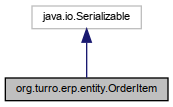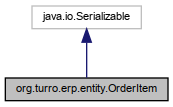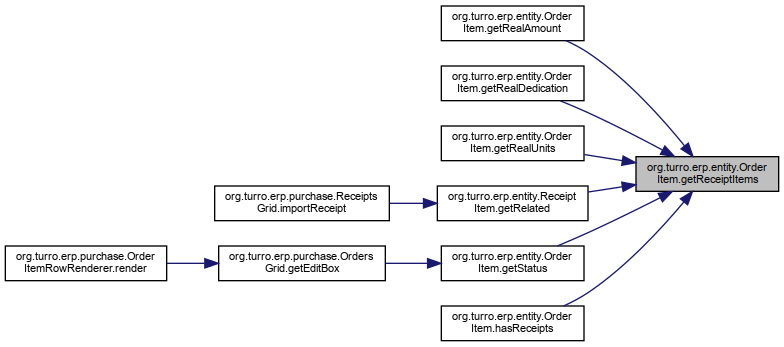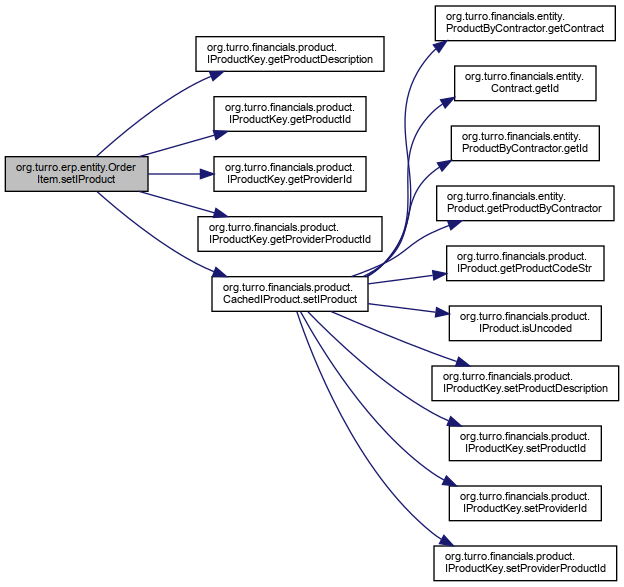- Author
- Lluis Turró Cutiller lluis.nosp@m.@tur.nosp@m.ro.or.nosp@m.g
Definition at line 42 of file OrderItem.java.
◆ convertToReal()
| double org.turro.erp.entity.OrderItem.convertToReal |
( |
double |
d | ) |
|
◆ getAmount()
| double org.turro.erp.entity.OrderItem.getAmount |
( |
| ) |
|
◆ getCost()
| double org.turro.erp.entity.OrderItem.getCost |
( |
| ) |
|
◆ getDedication()
| double org.turro.erp.entity.OrderItem.getDedication |
( |
| ) |
|
◆ getDelivery()
| Date org.turro.erp.entity.OrderItem.getDelivery |
( |
| ) |
|
◆ getDescription()
| String org.turro.erp.entity.OrderItem.getDescription |
( |
| ) |
|
◆ getDocumentDate()
| Date org.turro.erp.entity.OrderItem.getDocumentDate |
( |
| ) |
|
◆ getDocumentLine()
| DocumentLine org.turro.erp.entity.OrderItem.getDocumentLine |
( |
| ) |
|
Definition at line 291 of file OrderItem.java.
292 return documentLine.getEntity(documentLineId);
◆ getDocumentLineId()
| long org.turro.erp.entity.OrderItem.getDocumentLineId |
( |
| ) |
|
◆ getDocumentNumber()
| String org.turro.erp.entity.OrderItem.getDocumentNumber |
( |
| ) |
|
◆ getExpectedUnits()
| double org.turro.erp.entity.OrderItem.getExpectedUnits |
( |
| ) |
|
◆ getHumanResource()
| HumanResource org.turro.erp.entity.OrderItem.getHumanResource |
( |
| ) |
|
◆ getId()
| long org.turro.erp.entity.OrderItem.getId |
( |
| ) |
|
◆ getIProduct()
| IProduct org.turro.erp.entity.OrderItem.getIProduct |
( |
| ) |
|
Definition at line 317 of file OrderItem.java.
318 return iproduct.
getIProduct(
new IProductKey(productId, providerId, providerProductId, productDescription));
IProduct getIProduct(IProductKey productKey)
◆ getMaxCost()
| double org.turro.erp.entity.OrderItem.getMaxCost |
( |
| ) |
|
◆ getName()
| String org.turro.erp.entity.OrderItem.getName |
( |
| ) |
|
Definition at line 384 of file OrderItem.java.
385 if(humanResource !=
null) {
386 return humanResource.
getName();
387 }
else if(resource !=
null) {
391 return product !=
null ? product.getProductName() :
null;
◆ getOwner()
| OrderItem org.turro.erp.entity.OrderItem.getOwner |
( |
| ) |
|
Definition at line 367 of file OrderItem.java.
368 return (OrderItem)
new ErpPU().getSingleResultOrNull(
369 "select oi from OrderItem oi " +
371 new Object[] {
this });
◆ getOwnerRequiredUsage()
| RequiredUsage org.turro.erp.entity.OrderItem.getOwnerRequiredUsage |
( |
| ) |
|
Definition at line 374 of file OrderItem.java.
375 if(requiredUsage ==
null) {
378 return oi.getRequiredUsage();
381 return requiredUsage;
◆ getProduct()
| Product org.turro.erp.entity.OrderItem.getProduct |
( |
| ) |
|
Definition at line 307 of file OrderItem.java.
308 return product.getEntity(productId);
◆ getProductDescription()
| String org.turro.erp.entity.OrderItem.getProductDescription |
( |
| ) |
|
◆ getProductId()
| long org.turro.erp.entity.OrderItem.getProductId |
( |
| ) |
|
◆ getProvider()
| Contract org.turro.erp.entity.OrderItem.getProvider |
( |
| ) |
|
Definition at line 337 of file OrderItem.java.
338 return provider.getEntity(providerId);
◆ getProviderId()
| long org.turro.erp.entity.OrderItem.getProviderId |
( |
| ) |
|
◆ getProviderProduct()
Definition at line 353 of file OrderItem.java.
354 return providerProduct.getEntity(providerProductId);
◆ getProviderProductId()
| long org.turro.erp.entity.OrderItem.getProviderProductId |
( |
| ) |
|
◆ getRealAmount()
| double org.turro.erp.entity.OrderItem.getRealAmount |
( |
| ) |
|
◆ getRealDedication()
| double org.turro.erp.entity.OrderItem.getRealDedication |
( |
| ) |
|
Definition at line 461 of file OrderItem.java.
462 double q = 0.0d, d = 0.0d;
463 if(humanResource !=
null) {
466 d += ri.getUnits() * ri.getDedication();
469 return q != 0.0d ? d / q : 1.0d;
◆ getRealUnits()
| double org.turro.erp.entity.OrderItem.getRealUnits |
( |
| ) |
|
Definition at line 476 of file OrderItem.java.
479 q += ri.getUnits() * ri.getDedication();
◆ getReceiptItems()
| Set<ReceiptItem> org.turro.erp.entity.OrderItem.getReceiptItems |
( |
| ) |
|
Definition at line 221 of file OrderItem.java.
222 Dao dao =
new ErpPU();
223 if(
id > 0 && dao.isNotLoaded(receiptItems)) {
224 receiptItems = dao.lazyLoader(OrderItem.class,
this,
"receiptItems").receiptItems;
◆ getRelated()
| OrderItem org.turro.erp.entity.OrderItem.getRelated |
( |
| ) |
|
◆ getRequiredUsage()
| RequiredUsage org.turro.erp.entity.OrderItem.getRequiredUsage |
( |
| ) |
|
◆ getResource()
| Resource org.turro.erp.entity.OrderItem.getResource |
( |
| ) |
|
◆ getStatus()
| OrderStatus org.turro.erp.entity.OrderItem.getStatus |
( |
| ) |
|
Definition at line 435 of file OrderItem.java.
439 return OrderStatus.ORDER_PENDING;
441 return OrderStatus.ORDER_READY;
445 boolean processed =
false;
446 for(ReceiptItem ri : lri) {
447 tmp += ri.getUnits();
452 return OrderStatus.ORDER_RECEIVED;
454 return OrderStatus.ORDER_RECEIVED_PARTIALLY;
457 return OrderStatus.ORDER_READY;
◆ getTax()
| double org.turro.erp.entity.OrderItem.getTax |
( |
| ) |
|
◆ getType()
| String org.turro.erp.entity.OrderItem.getType |
( |
| ) |
|
Definition at line 395 of file OrderItem.java.
396 if(humanResource !=
null) {
398 }
else if(resource !=
null) {
◆ getUnits()
| double org.turro.erp.entity.OrderItem.getUnits |
( |
| ) |
|
◆ getUpdatedReceiptItems()
| Set<ReceiptItem> org.turro.erp.entity.OrderItem.getUpdatedReceiptItems |
( |
| ) |
|
Definition at line 229 of file OrderItem.java.
230 Dao dao =
new ErpPU();
232 receiptItems = dao.lazyLoader(OrderItem.class,
this,
"receiptItems").receiptItems;
◆ hasReceipts()
| boolean org.turro.erp.entity.OrderItem.hasReceipts |
( |
| ) |
|
◆ isCostMaximum()
| boolean org.turro.erp.entity.OrderItem.isCostMaximum |
( |
| ) |
|
◆ isEmpty()
| boolean org.turro.erp.entity.OrderItem.isEmpty |
( |
| ) |
|
◆ isProviderFixed()
| boolean org.turro.erp.entity.OrderItem.isProviderFixed |
( |
| ) |
|
◆ isSent()
| boolean org.turro.erp.entity.OrderItem.isSent |
( |
| ) |
|
◆ setCost()
| void org.turro.erp.entity.OrderItem.setCost |
( |
double |
cost | ) |
|
◆ setCostMaximum()
| void org.turro.erp.entity.OrderItem.setCostMaximum |
( |
boolean |
costMaximum | ) |
|
Definition at line 97 of file OrderItem.java.
98 this.costMaximum = costMaximum;
◆ setDedication()
| void org.turro.erp.entity.OrderItem.setDedication |
( |
double |
dedication | ) |
|
◆ setDelivery()
| void org.turro.erp.entity.OrderItem.setDelivery |
( |
Date |
delivery | ) |
|
◆ setDescription()
| void org.turro.erp.entity.OrderItem.setDescription |
( |
String |
description | ) |
|
◆ setDocumentDate()
| void org.turro.erp.entity.OrderItem.setDocumentDate |
( |
Date |
documentDate | ) |
|
◆ setDocumentLine()
| void org.turro.erp.entity.OrderItem.setDocumentLine |
( |
DocumentLine |
documentLine | ) |
|
Definition at line 295 of file OrderItem.java.
296 documentLineId = this.documentLine.setEntity(documentLine);
◆ setDocumentLineId()
| void org.turro.erp.entity.OrderItem.setDocumentLineId |
( |
long |
documentLineId | ) |
|
Definition at line 137 of file OrderItem.java.
138 this.documentLineId = documentLineId;
◆ setDocumentNumber()
| void org.turro.erp.entity.OrderItem.setDocumentNumber |
( |
String |
documentNumber | ) |
|
Definition at line 145 of file OrderItem.java.
146 this.documentNumber = documentNumber;
◆ setHumanResource()
| void org.turro.erp.entity.OrderItem.setHumanResource |
( |
HumanResource |
humanResource | ) |
|
Definition at line 161 of file OrderItem.java.
162 this.humanResource = humanResource;
◆ setId()
| void org.turro.erp.entity.OrderItem.setId |
( |
long |
id | ) |
|
◆ setIProduct()
| void org.turro.erp.entity.OrderItem.setIProduct |
( |
IProduct |
product | ) |
|
Definition at line 321 of file OrderItem.java.
322 IProductKey productKey = iproduct.
setIProduct(product);
323 productId = productKey.getProductId();
324 providerId = productKey.getProviderId();
325 providerProductId = productKey.getProviderProductId();
326 productDescription = productKey.getProductDescription();
IProductKey setIProduct(IProduct product)
◆ setMaxCost()
| void org.turro.erp.entity.OrderItem.setMaxCost |
( |
double |
maxCost | ) |
|
◆ setProduct()
| void org.turro.erp.entity.OrderItem.setProduct |
( |
Product |
product | ) |
|
Definition at line 311 of file OrderItem.java.
312 productId = this.product.setEntity(product);
◆ setProductDescription()
| void org.turro.erp.entity.OrderItem.setProductDescription |
( |
String |
productDescription | ) |
|
Definition at line 185 of file OrderItem.java.
186 this.productDescription = productDescription;
◆ setProductId()
| void org.turro.erp.entity.OrderItem.setProductId |
( |
long |
productId | ) |
|
◆ setProvider()
| void org.turro.erp.entity.OrderItem.setProvider |
( |
Contract |
provider | ) |
|
Definition at line 341 of file OrderItem.java.
342 providerId = this.provider.setEntity(provider);
◆ setProviderFixed()
| void org.turro.erp.entity.OrderItem.setProviderFixed |
( |
boolean |
providerFixed | ) |
|
Definition at line 201 of file OrderItem.java.
202 this.providerFixed = providerFixed;
◆ setProviderId()
| void org.turro.erp.entity.OrderItem.setProviderId |
( |
long |
providerId | ) |
|
◆ setProviderProduct()
Definition at line 357 of file OrderItem.java.
358 providerProductId = this.providerProduct.setEntity(providerProduct);
◆ setProviderProductId()
| void org.turro.erp.entity.OrderItem.setProviderProductId |
( |
long |
providerProductId | ) |
|
Definition at line 217 of file OrderItem.java.
218 this.providerProductId = providerProductId;
◆ setReceiptItems()
| void org.turro.erp.entity.OrderItem.setReceiptItems |
( |
Set< ReceiptItem > |
receiptItems | ) |
|
◆ setRelated()
| void org.turro.erp.entity.OrderItem.setRelated |
( |
OrderItem |
related | ) |
|
◆ setRequiredUsage()
| void org.turro.erp.entity.OrderItem.setRequiredUsage |
( |
RequiredUsage |
requiredUsage | ) |
|
Definition at line 253 of file OrderItem.java.
254 this.requiredUsage = requiredUsage;
◆ setResource()
| void org.turro.erp.entity.OrderItem.setResource |
( |
Resource |
resource | ) |
|
◆ setSent()
| void org.turro.erp.entity.OrderItem.setSent |
( |
boolean |
sent | ) |
|
◆ setTax()
| void org.turro.erp.entity.OrderItem.setTax |
( |
double |
tax | ) |
|
◆ setUnits()
| void org.turro.erp.entity.OrderItem.setUnits |
( |
double |
units | ) |
|
◆ startReceipt() [1/2]
| ReceiptItem org.turro.erp.entity.OrderItem.startReceipt |
( |
Date |
startWorking | ) |
|
Definition at line 409 of file OrderItem.java.
ReceiptItem startReceipt(Date startWorking)
◆ startReceipt() [2/2]
| ReceiptItem org.turro.erp.entity.OrderItem.startReceipt |
( |
Date |
startWorking, |
|
|
double |
receiptUnits |
|
) |
| |
Definition at line 413 of file OrderItem.java.
414 ReceiptItem ri =
new ReceiptItem();
415 ri.setOrderItem(
this);
416 ri.setDocumentDate(documentDate);
417 ri.setDocumentNumber(documentNumber);
418 ri.setHumanResource(humanResource);
419 ri.setResource(resource);
420 ri.setProductId(productId);
421 ri.setProviderId(providerId);
422 ri.setProviderProductId(providerProductId);
423 ri.setProductDescription(productDescription);
424 ri.setDescription(description);
425 ri.setUnits(receiptUnits);
426 ri.setDedication(dedication);
427 ri.setStartWorking(startWorking);
The documentation for this class was generated from the following file:















